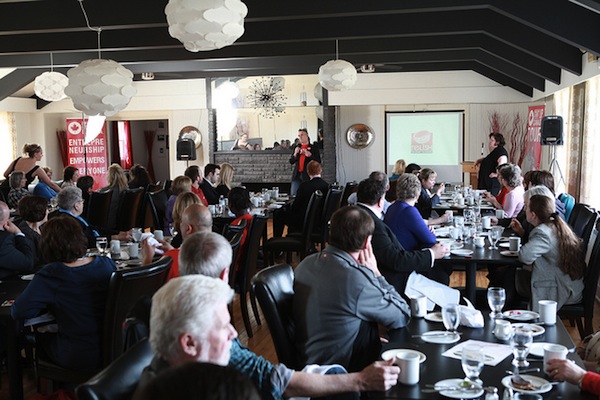
On March 22, CBU’s Shannon School of Business hosted the Startup Canada Sydney Town Hall. Startup Canada is an entrepreneur-led, national movement designed to enhance the nation’s competitiveness and prosperity by supporting and celebrating Canadian entrepreneurship. Startup Canada is touring across the country from March to September, engaging 25,000 Canadians and 250 partner organizations across the country. Entrepreneurs will participate in more than 30 town halls and 100 fringe events and connect through a social media groundswell campaign. By early Autumn, they hope to have a consolidated report of what’s possible, crafted by an entire country through town hall meetings, interviews, blogging, social media, presentations and research. Sydney was the tour’s fourth stop.
The motivational keynote speaker for the evening was Rivers Corbett, a “serial entrepreneur” based in New Brunswick, who had given a presentation earlier that day on the formation of Relish Burgers. It’s been his experience, he said, that while there are many programs and services available to entrepreneurs, they seem to prefer to talk to each other. Dan Brown and Keith Brown of CBU discussed different business models and the challenges of getting ahead without getting pulled down. Joe Menchefski of Billdidit shared his thoughts about the benefits of being in a business incubator–-sharing space and resources–to build your own business.
When Menchefski mentioned the advantages of having an engineer down the hall at the business incubator, he was referring to Jeff Slipp of Stomp Labs. Slipp’s building a “better mousetrap” or more accurately, a specialty guitar effects pedal. He says he finds being co-located with others “reduces the interaction cycle“ (in non Business School speak – it’s a continuous process – like tuning the car as you’re driving down the road). He enjoys the space – hopes to see some IT support and legal colleagues take up residence.
Cyril MacDonald from Albert Bridge was volunteering that night. He’s been working in his own business since he was 12 years old delivering flyers and mowing lawns. Now a seasoned teenager, he has expanded his operation to gardening and landscaping. He walks to work and has learned how to balance priorities as his customers want work done – all at the same time. He’s self-motivated, wants to go to university and looking for that next enterprise to start in Cape Breton.
In any business, knowing when to do it at home and when to move to a more commercial location is a balancing act of time, cost and accessibility. Jessie Deleskie, owner of The Cocoa Pod Sweet Catering is a professionally trained pastry chef who has grown both her business and family in Cape Breton. Deleskie has found that the contacts she’s made through the Cape Breton Farmers Market to be a good resource for her business, and that being a home-based business is a good fit for a young family giving more flexibility to her time schedule.
MaryJane Morrison, Director of the Small Business Development Center at Shannon School for Business at CBU, said Startup Canada expressed interest in coming to Cape Breton last fall. During the town hall portion of the event, where participants were tasked with building clusters of entrepreneurship, I had the opportunity to meet with individuals leading the national program and locally grown entrepreneurs, and found out about some local resources for new and emerging companies.
I finished the day speaking with the StartUp Canada director, Victoria Lennox, discussing the campaign ahead to barnstorm all of Canada “from Bonavista to Vancouver Island”. The program’s goal is to move ahead quickly, gathering input and ideas, distilling the best into a plan for launch in November.
There is a great potential within our community for new ideas and to grow new companies, to connect with each other, working together to build good “fits” for Cape Breton. There are resources available to help you get started. If it’s space you need, you may want to contact John Aylward at Venture Solutions Inc. Or if you need funding support, you can contact Lauren Gillis at Coastal Business. From my own experience (I went to college with a typewriter; I’m still struggling with social media), I’ve found the Small Business Development Center a good resource in the community.
Two things come to mind when I think about being an entrepreneur. First of all, how do you tell if what you feel impassioned about as a work idea is “real” or a hobby? To paraphrase composer Gustav Holst: “Never start anything unless not starting it becomes a positive nuisance to you”. For me, it’s a matter of how I set my priorities. If I’ll cancel vacation plans, stay up all night, go out on a limb for resources – those are good indications that it’s work. If you find it’s something you tinker with, putting it down the moment there’s a nice day and you run wild with the credit card because you feel you deserve it without a chance of financial return – that’s a hobby.
The other thing is to not get fancy when you are getting started – just get started. I learned this the hard way as I let myself buy a symbolic desk that cost more than my first car. It’s gone now and the kitchen table does just fine.

